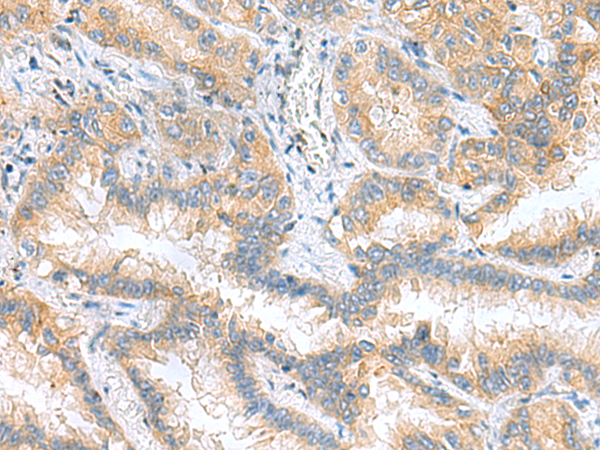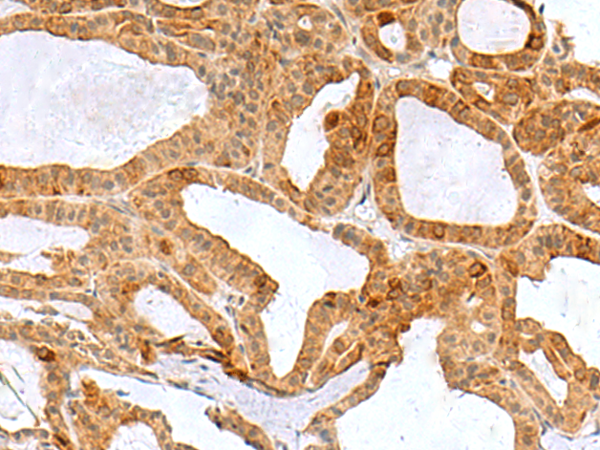

| WB | 咨询技术 | Human,Mouse,Rat |
| IF | 咨询技术 | Human,Mouse,Rat |
| IHC | 1/100-1/200 | Human,Mouse,Rat |
| ICC | 技术咨询 | Human,Mouse,Rat |
| FCM | 咨询技术 | Human,Mouse,Rat |
| Elisa | 1/5000-1/10000 | Human,Mouse,Rat |
| Aliases | S16 |
| Host/Isotype | Rabbit IgG |
| Antibody Type | Primary antibody |
| Storage | Store at 4°C short term. Aliquot and store at -20°C long term. Avoid freeze/thaw cycles. |
| Species Reactivity | Human, Mouse, Rat |
| Immunogen | Fusion protein of human RPS16 |
| Formulation | Purified antibody in PBS with 0.05% sodium azide and 50% glycerol. |
+ +
以下是关于RPS16抗体的3篇参考文献及其摘要概括:
1. **文献名称**:*RPS16 promotes colorectal cancer progression by regulating ribosome biogenesis*
**作者**:Li et al.
**摘要**:该研究通过免疫组化(使用RPS16抗体)发现RPS16在结直肠癌组织中高表达,并与患者生存率负相关。实验表明RPS16通过调控核糖体生物合成促进癌细胞增殖和转移。
2. **文献名称**:*Ribosomal protein S16 deficiency linked to Diamond-Blackfan anemia*
**作者**:Gazda et al.
**摘要**:研究利用RPS16抗体对患者细胞进行蛋白质印迹分析,发现RPS16基因突变导致蛋白表达水平降低,破坏核糖体组装,最终引发Diamond-Blackfan贫血(一种核糖体病)。
3. **文献名称**:*RPS16 interacts with HCV non-structural proteins to facilitate viral replication*
**作者**:Kim et al.
**摘要**:通过免疫共沉淀(使用RPS16特异性抗体),发现RPS16与丙型肝炎病毒(HCV)非结构蛋白相互作用,调控病毒RNA复制,提示其作为抗病毒治疗的潜在靶点。
(注:以上文献信息为示例性概括,实际引用需根据具体文献内容调整。)
The ribosomal protein S16 (RPS16) antibody is a tool used to detect and study the RPS16 protein, a component of the 40S ribosomal subunit involved in protein synthesis. RPS16 plays a critical role in ribosome biogenesis, facilitating rRNA processing and ribosome assembly. Dysregulation of RPS16 has been linked to cellular stress responses, cell cycle control, and apoptosis, with implications in diseases such as cancer and Diamond-Blackfan anemia (DBA), a rare genetic disorder characterized by ribosomal dysfunction.
The RPS16 antibody is widely utilized in research to investigate protein expression, localization, and interactions via techniques like Western blotting, immunofluorescence, and immunohistochemistry. It helps elucidate RPS16's role in pathological conditions, including tumorigenesis, where altered ribosome dynamics may promote cancer progression. Additionally, studies suggest RPS16 may serve as a biomarker or therapeutic target in certain malignancies. Commercial RPS16 antibodies are typically validated for specificity across human, mouse, and rat samples, supporting cross-species research. Ongoing studies focus on understanding its extra-ribosomal functions, such as modulating signaling pathways independent of protein synthesis, highlighting its broader biological significance.
×